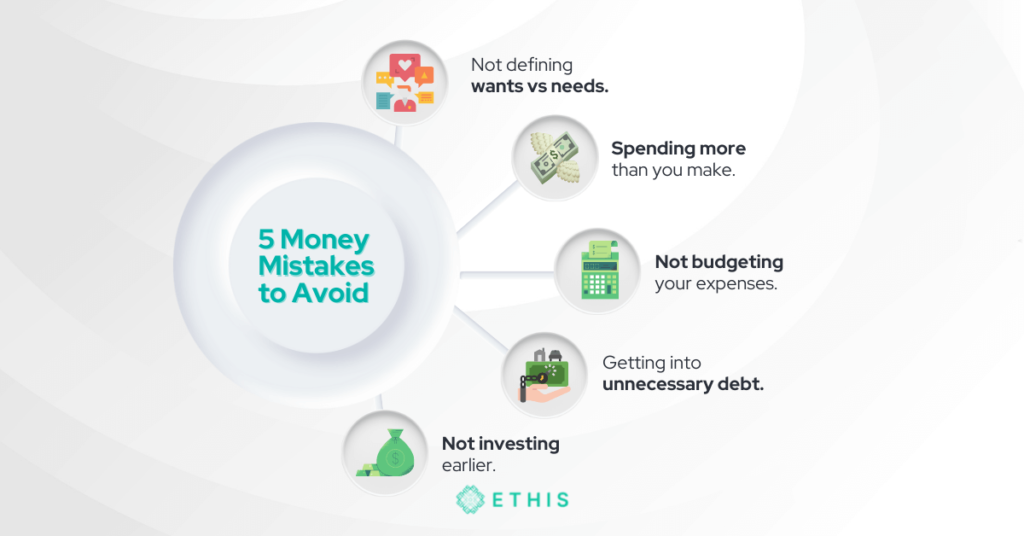
As humans, we are not devoid of making mistakes. This includes making the wrong move when it comes to our personal finances. There’s nothing wrong if you have a few financial regrets as long as you don’t keep making the same mistakes over and over again. While money mistakes are arguably subjective, some money mistakes are common. Here are five common money mistakes and steps you can take to steer away from them.
1) Not defining wants vs needs
Not defining wants versus needs can put your financial health at peril, especially when you do have a clear idea of where your money is going and how it is spent.
Needs are generally your basic living expenses, things necessary for your health, or expenses that are required for you to do your job, raise your children, and support your family. Wants are things you choose to buy to improve your life and live more comfortably but are not a necessity.
Though human basic needs are more or less the same, one’s needs vs wants vary from person to person depending on their health conditions and other factors. A car, for instance, is a need for most people but a luxurious car, no matter how rich a person is, will always be a want. A family car, on the other hand, could be a need for a big family but is a want for a small family.
When your budget screams for a little trimming, cutting out “want” purchases is the best way to manage your spending. Knowing the difference between wants and needs and identifying which is which in your budget is key in preventing you from spending beyond your means.
2) Spending more than you earn
According to Finance Minister of Malaysia, Tengku Datuk Seri Zafrul Abdul Aziz in a statement earlier this year, 40% of Malaysian millennials are spending beyond their means. It’s based on the finding by Bank Negara Malaysia that says 47% of Malaysian youths have high credit card debts.


Identifying which one is your wants vs your needs is crucial in ensuring that you do not spend more than you earn. Beware of the pitfall of keeping up with the Jones and impressing people that leads to excessive spending. If you have fallen prey to overspending, start correcting it by acknowledging that you need to cut down on spending.
Cut back on ‘wants’ aka nonessential expenses such as dining out, shopping, other entertainment and stay away from impulse purchases. Once you are back on track, make it a practice to live within your means and only buy things you can afford with the money you already have.
3) Not budgeting your expenses
When you do not have a budget, you do not have control of your finances. Budgeting is crucial in ensuring your monthly spending does not exceed your disposable income. Without a budget, you can make a decent income yet still struggle to get by.
Everything is clearer when you set a budget. By budgeting your monthly expenses, you can clearly track where your money is going and what you can afford to spend on. It imposes spending limits on yourself so you don’t spend beyond your means. This helps you from falling into unnecessary debts. These days, it’s easy to overuse and abuse credit cards. Before you realise it, you are overspending until you are drowning in debt.



Having a budget and sticking to it prevents you from this precarious situation. It puts you in charge of your finances. You’ll know exactly how much money you earn, how much you can afford to spend each month, and how much you need to save and prepare yourself for emergencies.
4) Getting into unnecessary debt is one of the common money mistakes
Some debts are necessary to take and are the only way for most people to afford to purchase basic necessities in life. House mortgage and car loans, for example, are two of the most basic debts that are hard to escape in this modern world.
Related: 5 Rules to Avoid Getting into Unnecessary Debt
Knowing when it’s necessary to take a loan and when it’s not is important. Taking a loan for your dream wedding or a holiday trip are some examples of unnecessary debts. Any type of debt can take a toll on the borrower’s life, never mind an unnecessary one. It puts unnecessary pressure on the household’s finances and creates a lack of financial security for yourself and your loved ones.


Many forms of debt can accrue late payment charges, interest fees and eventually be sent to collection agencies if not taken care of promptly. It is important to make a plan to clear your debt as soon as you can.
The best way to practice good money management is to stay out of unnecessary debt altogether. When you live within your means and budget your expenses, you are less likely to get into unnecessary debt.
5) Not investing earlier
It takes time for your money to grow. The earlier you start investing, the greater the accumulated return on your investment and the more money you make. When you start earlier, you will also have more room and opportunities to make investing mistakes and learn from them.
There is a massive difference between starting your investment portfolio at 20 versus at 30. The later you start, the fewer chances you get to earn passive income and grow your investments. Nonetheless, as the saying goes, it’s always better late than never at all.
In this modern age, investing is now at the tip of your fingers thanks to the advent of technology which makes accessibility to different instruments easier. All you have to do is to research and do your due diligence to find the ones that suit your finances and financial goals the most. No one size fits all so determine your risk profile, level of commitment and align it with your goals.
Related: 5 Factors to Help you Better Invest in Short- and Long-Term Investments


When it comes to investing, don’t put all your eggs in one basket. Diversify your investment with Ethis, the world’s best Islamic crowdfunding platform that offers equity crowdfunding and peer-to-peer lending investment options.
Learn more at ethis.co!





Top Posts
Islamic P2P Crowdfunding Explained
Halal Money Matters: How Muslims Can Balance Deen and Dunya with Smart Islamic Finance
Halal Investments for Singapore Muslims? It’s time for a shake-up in the Islamic Investments scene.
Smart investment for making Halal money
3 Reasons Why Property Crowdfunding is the Smart Investment for You